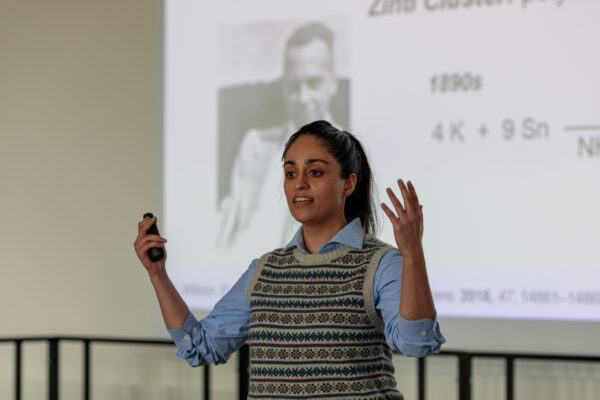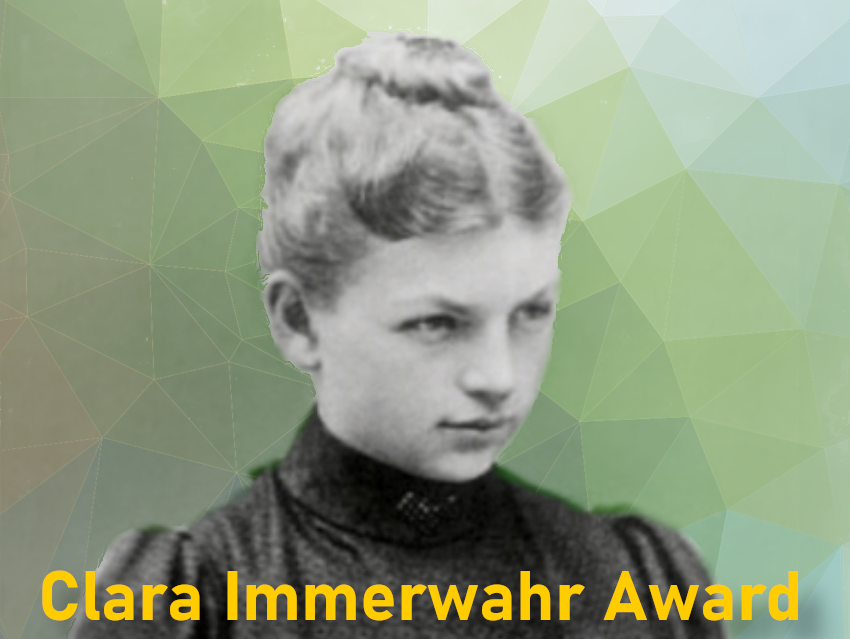Meera Mehta, University of Oxford, UK, has been awarded the Clara Immerwahr Award 2024 for her outstanding achievements in catalysis research. The award was presented at a ceremony at the Technical University of Berlin (TU Berlin), Germany, on April 12, 2024.
The award recognizes outstanding research in the field of catalysis by an excellent young female scientist at an early stage of her career (i.e., as a postdoctoral fellow or junior researcher). It is presented by the Excellence Cluster “Unifying Systems in Catalysis” (UniSysCat) and sponsored by BASF SE. The prize comes with EUR 15,000 in financial support for a research stay at UniSysCat.
Mehta’s research interests include understanding the fundamental reactivity patterns of homogenous main group compounds for the development of sustainable catalysts. She and her group work on applying such metal-free catalysts for the synthesis of important feedstock chemicals used by the manufacturing sector and for the removal and recycling of environmental toxins. These research efforts are in line with UN sustainable development goals as well as the European Green Deal and global clean growth efforts. Much of the team’s work focuses on the design of group 14 and 15 main group clusters to uncover unprecedented electronic and bonding structures, as well as finding applications in synthesis. Mehta’s award lecture will cover “Zintl Clusters as Synthetic Tools”.
Meera Mehta was born in Toronto, Canada. She completed her undergraduate degree in 2012 at McMaster University, Hamilton, Canada, and her Ph.D. in 2017 at the University of Toronto under the supervision of Douglas Stephan. In 2018, she was awarded a Royal Society Newton International Fellowship to work with Jose Goicoechea at the University of Oxford. In 2020, Mehta joined the University of Manchester, UK, where she established an independent research group. In January 2024, she returned to the University of Oxford as an Associate Professor in Inorganic Chemistry. She has also been awarded a 2023 ERC Starting Grant.

Meera Mehta during her presentation. Photo: Mario Müller
Selected Publications
- Zintl Ions and Phases Promote the Catalytic Hydrophosphination of Alkynes, Alkenes, and Imines,
Benjamin L. L. Réant, Meera Mehta,
Organometallics 2024, 43, 395–401.
https://doi.org/10.1021/acs.organomet.3c00494 - A robust Zintl cluster for the catalytic reduction of pyridines, imines and nitriles,
Bono van IJzendoorn, Jessica B. M. Whittingham, George F. S. Whitehead, Nikolas Kaltsoyannis, Meera Mehta,
Dalton Trans. 2023, 52, 13787–13796.
https://doi.org/10.1039/d3dt02896h - Reactivity of tetrel functionalized heptapnictogen clusters towards heteroallenes,
William D. Jobbins, Bono van IJzendoorn, Inigo J. Vitorica-Yrezabal, George F. S. Whitehead, Meera Mehta,
Dalton Trans. 2023, 52, 2384–2391.
https://doi.org/10.1039/d2dt04074c - Metal-Free Phosphine Oxide Reductions Catalyzed by B(C6F5)3 and Electrophilic Fluorophosphonium Cations,
Meera Mehta, Isaac Garcia de la Arada, Manuel Perez, Digvijay Porwal, Martin Oestreich, Douglas W. Stephan,
Organometallics 2016, 35, 1030–1035.
https://doi.org/10.1021/acs.organomet.6b00158 - Catalytic Ketone Hydrodeoxygenation Mediated by Highly Electrophilic Phosphonium Cations,
Meera Mehta, Michael H. Holthausen, Ian Mallov, Manuel Pérez, Zheng‐Wang Qu, Stefan Grimme, Douglas W. Stephan,
Angew. Chem. Int. Ed. 2015, 54, 8250–8254.
https://doi.org/10.1002/anie.201502579 - The Highly Lewis Acidic Dicationic Phosphonium Salt: [(SIMes)PFPh2][B(C6F5)4]2,
Michael H. Holthausen, Meera Mehta, Douglas W. Stephan,
Angew. Chem. Int. Ed. 2014, 53, 6538–6541.
https://doi.org/10.1002/anie.201403693
Also of Interest




